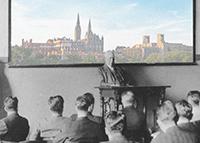
Nobel Prize scientist Joshua Lederberg said that in order for science to advance and to have a knowledge society, simple generation of knowledge is not enough; the information must also be shared and communicated. Scientific literacy depends on access to information. In the era of the Internet, what new possibilities do digitally-mediated forms of scholarship provide to publicize, access, absorb and interact with knowledge?
This symposium brings together a panel of experts in computer science, biology and physics to discuss the ways that scientists use the Internet to create knowledge, disseminate and share data and communicate ideas, opinions and concepts. With examples from their own experience, the panelists will highlight some of the greatest opportunities and challenges new technologies offer the sciences. We will also explore the issue of whether the use of the Internet for scholarly communication in science differs from its use in the social sciences or humanities.
The presentation will be followed by an open Q&A session. Refreshments will be served.
Professor Anne Rosenwald leads a cell biology lab at Georgetown studying the different activities in membrane-bound compartments within cells and how those compartments communicate with each other. In addition, she is involved in two science education efforts geared towards training today’s undergraduate students in current science methodology around sequencing genomes and understanding gene expression. Professor Rosenwald is the Co-Director of Georgetown’s major in Biology of Global Health, a novel program which aims to educate scientists not only in scientific disciplines, but also in policy, bioethics, economics, law and other related topics.
Lisa Singh has been a professor in the Computer Science Department at Georgetown since 2002. She is an expert in database systems, specifically data mining and data warehousing, and her research centers on mining social networks, anomaly detection, graph databases, data reduction of large graph data sets and privacy preserving data mining. She is actively engaged in collaborations with the Census Bureau, Hewlett Packard, the University of Maryland, the University of California, Santa Cruz, and the Shark Bay Dolphin Research project. Professor Singh served as the Director of Undergraduate Studies from 2008 to 2010.
Professor S. James Gates is a University System Regents Professor, the John S. Toll Professor of Physics and the Director of the Center for String and Particle Theory at the University of Maryland, College Park. He is known for his work on supersymmetry, supergravity and superstring theory. He has been elected to the American Academy of Arts and Sciences, the American Philosophical Society and the National Academy of Science. In 2013, President Obama awarded Professor Gates the National Medal of Science, the highest recognition given by the U.S. to scientists, “for his contribution to the mathematics of supersymmetry in particle, field, and string theories and his extraordinary efforts to engage the public on the beauty and wonder of fundamental physics.’’
Janet Mann is a Professor of Biology and Psychology at Georgetown, with expertise is in the field of animal behavior. Since 1988 her work has focused on social networks, female reproduction, calf development, life history, conservation, tool-use, social learning and culture among the bottlenose dolphins of Shark Bay, Australia. Her long-term study "The Shark Bay Dolphin Research Project", tracks over 1600 dolphins throughout their lives and includes an international team on three continents. Professor Mann frequently publishes with her undergraduate and graduate students and her research has received considerable attention both within the field and by the popular media. In 2011 she received two mentoring awards in recognition of her deep commitment to undergraduate education.
